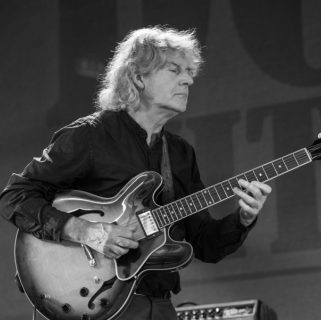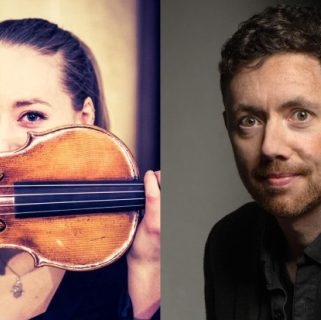
Chris Potter’s Underground
The players are:
- Chris Potter – saxophones
- Fima Ephron - Bass
- Wayne Krantz – guitar
- Ari Hoenig – drums
Events accelerated considerably for young saxophonist Chris Potter at the beginning of the new millennium. For one, he was solicited from all sides by prestigious musicians: whatever their generation or stylistic obedience, they all seemed impatient to acquire his services - from Dave Holland to Dave Douglas, Joachim Kühn, Michel Portal, Danilo Perez and Steely Dan…
Suddenly, too, international critics were overwhelmingly unanimous in their appreciation of his two records for Verve (Gratitude in 2001, and Traveling Mercies hard on its heels), both of them authentic jewels of freshness and invention beneath the veneer of their formal perfection. Wearing the halo of the prestigious Jazzpar Prize, a kind of Nobel Jazz Prize usually conferred on more experienced, long-recognized musicians, Chris Potter suddenly found himself propelled into the sunlight at the age of thirty, and from one day to the next he was introduced as the new Messiah by all the component parts of a hyper-selective milieu little-accustomed to enthusiasm for the prowess of a greenhorn, however brilliant.
His new status might have unsettled him, and his newfound glory gone to his head, had the saxophonist been the kind of greenhorn that some people took him to be at the time… But contrary to appearances, Chris Potter was anything but a tenderfoot in the pitiless world of modern jazz. With some fifteen albums already behind him, and more than one hundred sessions as a sideman to his credit in extremely varied registers - from the Mingus Big Band to the electric be-bop band led by Paul Motian ; from Jack DeJohnette, James Moody or John Scofield to Marlena Shaw or Jim Hall, his powers of adaptation were positively amazing – not to mention a dozen albums as a leader (his first opus, Presenting Chris Potter, for Criss Cross, dates from 1992 when he was only 21…), Potter had all the ‘capabilities’ he might need to envisage his transformation into one of those awesome studio ‘sharks’ rife in the Big Apple, had his ambitions not pushed him irresistibly towards associations that were increasingly adventurous, and towards horizons ever less well-defined.
He gave priority to long-haul collaborations that were ambitious and confidential (Motian, Steve Swallow, Dave Holland), instead of to ‘good deals’ that were rewarding. He preserved his phenomenal technique (fluid phrasing, and a physical, felt-lined sound), allayed suspicion, and remained ready to counter any theoretical lack of inspiration that might appear… Never one to seek facility, Chris Potter possessed the rare virtues of those who show signs of a future worthy of the greatest: a demanding nature, and integrity.
The most recent confirmation of this: Lift, the album he recorded ‘live’ in the legendary lair known as The Village Vanguard. Leading his own regular quartet (pianist Kevin Hays, with his delicate touch and subtle introductions; Scott Colley on bass, flexible, loose and powerfully anchored in the heart of time; Bill Stewart, powerful, catlike, and a stunning virtuoso), Potter has produced anything but “another live album”. Even if it does, in a certain manner, recapitulate all the qualities of power, control and savoir-faire which had always made his music interesting, a skilled, inspired synthesis of forty years of modern jazz, Lift could well be a milestone-recording for Potter, an album in which the young saxophonist, for the very first time, relinquishes something of the order in his mastery of the instrument to open himself up totally, body and soul, and allow us to glimpse, as never before, the immense potential of his talent.
There is a new commitment here, something sensual and vibratory in these long sequences of collective improvisation, an authentic esprit de corps that no gratuitous virtuosity could ever threaten – in a word, a sense of swing, totally jubilant, that is at once extremely modern in the forms it borrows, and utterly timeless in spirit.





